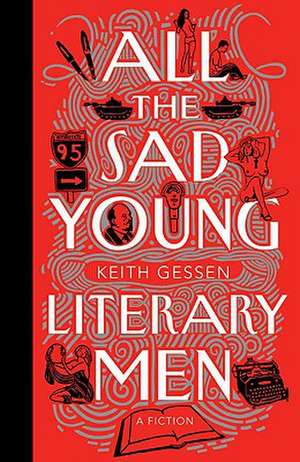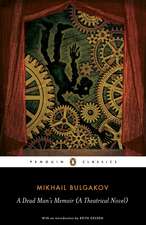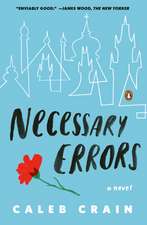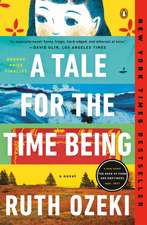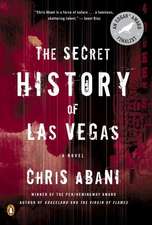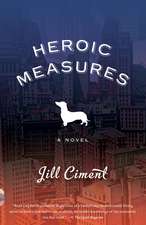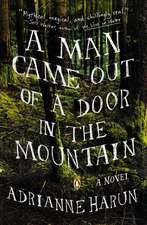All the Sad Young Literary Men
Autor Keith Gessenen Limba Engleză Paperback – 28 feb 2009 – vârsta de la 18 ani
A novel of love, sadness, wasted youth, and literary and intellectual ambition-"a wincingly funny debut" (Vogue)
Keith Gessen is a Brave and trenchant new literary voice. Known as an award-winning translator of Russian and a book reviewer for publications including The New Yorker and The New York Times, Gessen makes his debut with this critically acclaimed novel, a charming yet scathing portrait of young adulthood at the opening of the twenty-first century. The novel charts the lives of Sam, Mark, and Keith as they overthink their college years, underthink their love lives, and struggle to find a semblance of maturity, responsibility, and even literary fame.
Keith Gessen is a Brave and trenchant new literary voice. Known as an award-winning translator of Russian and a book reviewer for publications including The New Yorker and The New York Times, Gessen makes his debut with this critically acclaimed novel, a charming yet scathing portrait of young adulthood at the opening of the twenty-first century. The novel charts the lives of Sam, Mark, and Keith as they overthink their college years, underthink their love lives, and struggle to find a semblance of maturity, responsibility, and even literary fame.
Preț: 120.81 lei
Nou
Puncte Express: 181
Preț estimativ în valută:
23.12€ • 24.72$ • 19.27£
23.12€ • 24.72$ • 19.27£
Carte disponibilă
Livrare economică 27 martie-10 aprilie
Preluare comenzi: 021 569.72.76
Specificații
ISBN-13: 9780143114772
ISBN-10: 0143114778
Pagini: 242
Ilustrații: 3 b/w photos
Dimensiuni: 131 x 210 x 17 mm
Greutate: 0.21 kg
Editura: Penguin Books
ISBN-10: 0143114778
Pagini: 242
Ilustrații: 3 b/w photos
Dimensiuni: 131 x 210 x 17 mm
Greutate: 0.21 kg
Editura: Penguin Books
Recenzii
"Gessen proves himself not only a capable observer but a natural novelist with a warm gun . . . [and] a nice comic sureness. . . . Gessen's style is good-natured and ripe enough to allow a satisfying sweetness to exist in these characters."
-The New York Times Book Review
"Cruelty and affection and erudition and innocence are so perfectly balanced in these stories, they almost make me wish I were young again."
-Jonathan Franzen, author of The Corrections and The Discomfort Zone
-The New York Times Book Review
"Cruelty and affection and erudition and innocence are so perfectly balanced in these stories, they almost make me wish I were young again."
-Jonathan Franzen, author of The Corrections and The Discomfort Zone
Notă biografică
Keith Gessen was born in Russia and currently lives in Brooklyn. He was educated at Harvard and Syracuse. He is a founder of the magazine n+1 and translator of the National Book Critics Circle Award-winning Voices from Chernobyl. His work has also appeared in the Dissent, the New Yorker, and the New York Review of Books. All the Sad Young Literary Men is his first book.
Extras
His Google was shrinking. It was part of a larger failing, maybe, certainly, but to see it quantified... to see it numerically confirmed... it was cruel. It wasn’t nice. Sam considered the alternatives: he had friends with no Google at all, zero hits, and he even had friends, like Mark Grossman, whose name drew up the hits of other Mark Grossmans, the dentist Grossman and the banker Grossman and Grossmans who had completed 10-kilometer runs. But Sam wondered—the afternoon was young and there was time for it—whether Mark Grossman might not be better off. A man of the future, he would appear on Google yet. There, he would say when that moment came. I, too, am Grossman.
Sam: not Grossman. Sam: not even the size of Sam-of-old, Sam of last year, Sam of two weeks ago. After he’d failed to produce the great Zionist epic he’d been contracted to produce, after he’d stopped writing the occasional freelance article on the second Intifada, after he’d resumed his temp job to begin paying back the advance, there was, in the world, increasingly less Sam. [He backed away from the computer, into the dark, heavy tapestry that split his living room in two and composed of this pathetic little desk and shelf, with its mass of undigested papers, its pile of battered books—a tax-deductible home office. Occasionally he photographed it, this consolation, this small triumph over the masters of his fate. His Google, too, had been a consolation once: if in those heady days, a book deal in his pocket, a girlfriend of complex cosmetic habits in his bedroom, his little AOL mailbox was momentarily silent and unmoving he simply strolled over to Google to confirm that he still existed. Did he ever! Three-hundred-some-odd pages of Samuel Mitnick on the World-Wide-Web, accessible to people everywhere, at any time. Want some Sam? Here you go. Some more? Click, click. Even absolutist states, even China had Google—and there were a lot of people, he’d thought then, in China.
But not enough, apparently, or maybe they just weren’t clicking through... for here he was.] He wasn’t due at Celerity until four, it was barely one, and he needed to get out. Tomorrow night his date with Christine, author of sex advice, he should really stay and clean up, clean himself up, but this apartment was more than he could bear. And, in any case, if Christine hadn’t seen the signs by now, she’d never see them. His unreliable car; his jeans with a hole in them just above the ankle. From what? He had no idea. They would have dinner, dinner at Fae’s, the place where people saw you in the window when they walked by. He looked too shoddy to leave the house but he left the house. Out there: no Google; in here: Google; on Google: no Sam.
Or almost no Sam. Twenty-two. He was at twenty-two and plunging.
He patted his pocket for keys and moved out the door. Sam had other problems, maybe, or anyway the world did. Enter “misery” or “illness” or “plague” and what you saw was pages upon pages. Palestine. Sharon-Arafat. “Occupation.” Put things in quotes and you narrowed the search, and yet, “Instructions for making a bomb to kill a Jew,” or, “Directions to the nearest village where I can shoot Arabs”—very popular searches, page after virtual page of results. Sam would never have so many hits.
Sam boarded the Red Line train at Harvard Square. Some people woke up before noon, and what did it get them? A good seat on the inbound 8:45, maybe. Maybe it got them that seat. But at 3:30 every seat was good, and there were plenty to go around. Perhaps this is why Sam worked the late shift at Celerity. It also meant less interaction with the bankers themselves, some of whom were Sam’s former classmates—some of whom, in that former life, he had asked out on dates. In certain parts of the temp world his mastery of Excel still held cachet, still commanded attention; but less so, increasingly less so, in the five-year alumni report he kept buried, but constantly updated, deep inside his heart.
The Google had helped, once. His poor little Google! Was there nothing to be done?
Arriving at work five minutes late, Sam ducked into the bathroom and changed into his work clothes, a pair of khakis and his tie, hopping around on one foot while he tried to keep from stepping on the bathroom floor. The toilet with its scan-flusher kept flushing and flushing behind him as he hopped.
"Are you okay in there?" someone asked when he was almost done, causing him to trip into the door, the right side of his face momentarily keeping the rest of him from falling.
When Sam finally entered the cavernous main space of Celerity’s Creative Services, where a thousand monkeys clacked away at a thousand PowerPoint presentations, he tried to keep his head up proudly. He had once quit this place so that he could write his epic, and when he returned some of his coworkers—made fun of him. They resented his ambition, and even more they resented his failure. The Creative Services department at Celerity was like a small town in an American movie from which everyone dreamt of escaping. It was the end of the line—and to return, at the end of the line, to the end of the line, was not what Sam had planned for himself.
Sam: not Grossman. Sam: not even the size of Sam-of-old, Sam of last year, Sam of two weeks ago. After he’d failed to produce the great Zionist epic he’d been contracted to produce, after he’d stopped writing the occasional freelance article on the second Intifada, after he’d resumed his temp job to begin paying back the advance, there was, in the world, increasingly less Sam. [He backed away from the computer, into the dark, heavy tapestry that split his living room in two and composed of this pathetic little desk and shelf, with its mass of undigested papers, its pile of battered books—a tax-deductible home office. Occasionally he photographed it, this consolation, this small triumph over the masters of his fate. His Google, too, had been a consolation once: if in those heady days, a book deal in his pocket, a girlfriend of complex cosmetic habits in his bedroom, his little AOL mailbox was momentarily silent and unmoving he simply strolled over to Google to confirm that he still existed. Did he ever! Three-hundred-some-odd pages of Samuel Mitnick on the World-Wide-Web, accessible to people everywhere, at any time. Want some Sam? Here you go. Some more? Click, click. Even absolutist states, even China had Google—and there were a lot of people, he’d thought then, in China.
But not enough, apparently, or maybe they just weren’t clicking through... for here he was.] He wasn’t due at Celerity until four, it was barely one, and he needed to get out. Tomorrow night his date with Christine, author of sex advice, he should really stay and clean up, clean himself up, but this apartment was more than he could bear. And, in any case, if Christine hadn’t seen the signs by now, she’d never see them. His unreliable car; his jeans with a hole in them just above the ankle. From what? He had no idea. They would have dinner, dinner at Fae’s, the place where people saw you in the window when they walked by. He looked too shoddy to leave the house but he left the house. Out there: no Google; in here: Google; on Google: no Sam.
Or almost no Sam. Twenty-two. He was at twenty-two and plunging.
He patted his pocket for keys and moved out the door. Sam had other problems, maybe, or anyway the world did. Enter “misery” or “illness” or “plague” and what you saw was pages upon pages. Palestine. Sharon-Arafat. “Occupation.” Put things in quotes and you narrowed the search, and yet, “Instructions for making a bomb to kill a Jew,” or, “Directions to the nearest village where I can shoot Arabs”—very popular searches, page after virtual page of results. Sam would never have so many hits.
Sam boarded the Red Line train at Harvard Square. Some people woke up before noon, and what did it get them? A good seat on the inbound 8:45, maybe. Maybe it got them that seat. But at 3:30 every seat was good, and there were plenty to go around. Perhaps this is why Sam worked the late shift at Celerity. It also meant less interaction with the bankers themselves, some of whom were Sam’s former classmates—some of whom, in that former life, he had asked out on dates. In certain parts of the temp world his mastery of Excel still held cachet, still commanded attention; but less so, increasingly less so, in the five-year alumni report he kept buried, but constantly updated, deep inside his heart.
The Google had helped, once. His poor little Google! Was there nothing to be done?
Arriving at work five minutes late, Sam ducked into the bathroom and changed into his work clothes, a pair of khakis and his tie, hopping around on one foot while he tried to keep from stepping on the bathroom floor. The toilet with its scan-flusher kept flushing and flushing behind him as he hopped.
"Are you okay in there?" someone asked when he was almost done, causing him to trip into the door, the right side of his face momentarily keeping the rest of him from falling.
When Sam finally entered the cavernous main space of Celerity’s Creative Services, where a thousand monkeys clacked away at a thousand PowerPoint presentations, he tried to keep his head up proudly. He had once quit this place so that he could write his epic, and when he returned some of his coworkers—made fun of him. They resented his ambition, and even more they resented his failure. The Creative Services department at Celerity was like a small town in an American movie from which everyone dreamt of escaping. It was the end of the line—and to return, at the end of the line, to the end of the line, was not what Sam had planned for himself.
Descriere
Gessen's acclaimed debut offers a charming yet scathing portrait of young adulthood in the 21st century. The novel charts the lives of Sam, Mark, and Keith as they overthink their college years, underthink their love lives, and struggle to find a semblance of maturity.
